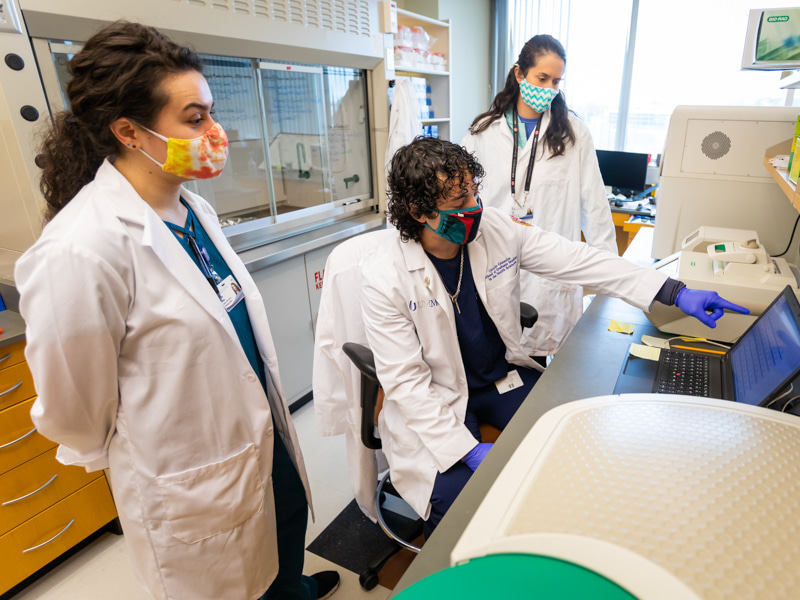Study: Diabetes, COVID-19 combo riskier for Blacks, Hispanics

Diabetes is rampant in Mississippi, and right now, so is the COVID-19 infection.
But when those two collide, a study authored by a University of Mississippi Medical Center faculty member warns, Black patients coping with both Type 1 diabetes and the virus are about four times as likely to be hospitalized for life-threatening diabetic ketoacidosis as someone who’s white.

“It gets worse if you are a Black man or woman with diabetes, in terms of COVID,” said Dr. Osagie Ebekozien, assistant professor of population health in the John D. Bower School of Population Health. Ebekozien also serves as vice president of population health and quality improvement at the nonprofit T1D Exchange.
His findings were published Jan. 7 in the Journal of Clinical Endocrinology and Metabolism in a paper that has garnered much attention nationally at a time when COVID-19 hospitalizations and deaths were on the rise.
The study showed that Black COVID-19 patients with Type 1 diabetes have about four times the risk of also developing diabetic ketoacidosis, a life-threatening condition that occurs when a Type 1 diabetes patient’s blood sugars are very high, but their insulin levels are very low. In Hispanic patients with both COVID-19 and Type 1 diabetes, it’s about twice the risk, the study showed.
Diabetic ketoacidosis, or DKA, can be triggered by an infection or illness, such as COVID-19. When DKA occurs, it keeps the person’s cells from getting the glucose they need for energy, so their body begins to burn fat for energy. That produces a buildup of blood acids called ketones, and it leads to diabetic ketoacidosis – and possibly coma or death - if untreated.
Statistics from the Diabetes Foundation of Mississippi show that in 2018, the most recent year available, Mississippi ranked second in the nation in overall prevalence of diabetes behind West Virginia. About 327,000 Mississippians had either Type 1 or Type 2 diabetes, and an estimated 25 percent more were undiagnosed and untreated.
Broken down by ethnicity in Mississippi, those diagnosed represented 13 percent of the white population, 15.9 percent Black and 13.2 percent Hispanic. In the Choctaw/Native American population, it’s much higher – and estimated 33-50 percent. Of those diagnosed as diabetic, 10.6 percent were college graduates, but almost 23 percent hadn’t completed high school, the Foundation statistics say.
Although previous studies have pointed to significant evidence that patients with Type 2 diabetes are more at risk for worse COVID-19 outcomes that include hospitalization, intubation and death, Ebekozien said, his study demonstrates that patients with less common Type 1 diabetes also have increased risk. The study takes in 52 clinical sites nationally, with data collected between April-August 2020.
A number of factors drive the added risk due to COVID-19, Ebekozien said, among them a patient being advanced in age, disparities that keep a patient from getting the diabetes care they need – and systemic racism. He said the 180-person study is the first significant look at the racial and ethnic inequities impacting people with Type 1 diabetes infected with the virus.
“Even when we adjust for other things that contribute, like sugar levels, when someone was diagnosed with diabetes, or their use of diabetes technology, we still see high differences,” Ebekozien said. “There are a lot of systemic inequities, and that is rearing its ugly head in the case of (Black) patients with Type 1 diabetes having worse outcomes.”
Notwithstanding COVID-19, he said, Black and Hispanic patients with Type 1 diabetes have significantly lower rates of using technology that includes continuous glucose monitoring or insulin control than white patients. That means that going into a COVID-19 diagnosis, their diabetes often isn’t as well controlled as in white patients with Type 1 diabetes.
Ebekozien’s study has critical implications for Mississippians and all who cope with diabetes, said Dr. Charles Chima, assistant professor of population health science.

“Early data has shown that African Americans and other racial/ethnic minorities are more likely to contract COVID-19, possibly due to a higher likelihood of exposure,” said Chima, who also serves as program director for the school’s Executive Master of Science in Population Health Management.
Findings of the study have “huge implications for Mississippi, considering its high proportion of Blacks,” he said. “Thus, Black Mississippians with diabetes and/or other chronic comorbidities need to be prioritized in ongoing COVID-19 prevention efforts, especially vaccination.”
“The big message is that glucose control is linked to worse outcomes with COVID,” Ebekozien said. “These patients need to understand that they have increased risk, and not so much because of their skin color, but because of who gets access to care, who gets medical devices that can make them feel better, and who has the means to control their blood sugar.”
The study shows it’s critical that practitioners caring for Black and Hispanic patients with Type 1 diabetes – and Type 2 – have conversations about availability of insulin and technology to manage their disease, and social disparities that can impact how well a diabetic patient can take care of themselves, such as access to healthy food, transportation and a safe place to live.
“We are trying to help patients advocate for themselves, and to say, ‘Look, I need to be able to check my sugar because it isn’t well controlled. I need medications.’” Ebekozien said.
“Those patients with diabetes need to take much stronger precautions,” Ebekozien said “If you get sick or have COVID, discuss with your doctor how to reduce your risk of being hospitalized. Take your medications the right way, Use your insulin the right way. Our study shows that if you can work with your provider to control your sugar level, it reduces your risk of going into the hospital.”


